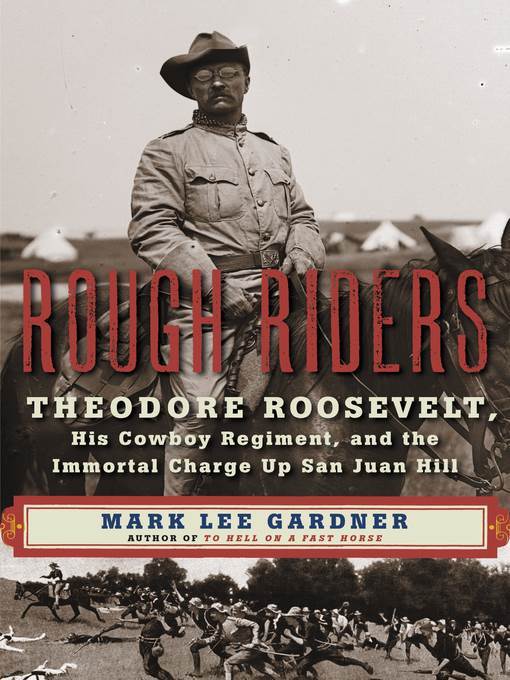
Rough Riders
Theodore Roosevelt, His Cowboy Regiment, and the Immortal Charge Up San Juan Hill
کتاب های مرتبط
- اطلاعات
- نقد و بررسی
- دیدگاه کاربران
نقد و بررسی

June 20, 2016
Gardner (To Hell on a Fast Horse), a historian specializing in the American West, uses new primary sources to reintroduce the public to the Rough Riders of the Spanish-American War. Following the national uproar over the 1898 sinking of the USS Maine, President McKinley agrees to prepare for war in order to expel the Spanish from Cuba. McKinley's forces include a volunteer cavalry suggested by Theodore Roosevelt, who was then assistant secretary of the Navy. Gardner examines Roosevelt's notions of war's redeeming qualities in light of his sickly youth, his father's reluctance to fight in the Civil War, and the dual heartbreaks of his wife and mother dying within hours of each other in 1884. Once the military buildup was authorized by Congress, the press called the First U.S. Volunteer Cavalry "Roosevelt's Rough Riders"âa motley unit made up of cowpunchers, Native American warriors, Ivy League athletes, sharpshooters, and assorted mavericks. Gardner provides some terrifying, exhilarating stories of the battle, including the valiant charge up San Juan Hill through enemy gunfire. Throughout, Gardner celebrates Roosevelt, who as a postwar commander-in-chief never forgot the lesson of war and the heroic sacrifices of the fighters.

February 15, 2016
From Western historian Gardner (To Hell on a Fast Horse) comes this well-researched, blithely novelistic rendition of Theodore Roosevelt's leadership in the Spanish-American War (1898), just three years prior to his becoming America's 26th president. On the outbreak of war with Spain, Roosevelt, then merely a midlevel federal bureaucrat, sponsored a volunteer cavalry regiment comprising cowboys, college boys, lawyers, and assorted others, whose spirited charge up Cuba's San Juan Hill is a staple of U.S. history textbooks. Quoting from dispatches, newspapers, and other primary sources, Gardner delivers rousing blow-by-blow accounts of the various battles and showcases Roosevelt's hypermasculine panache, along with his scrappy troopers' eagerness for a "bully fight" in what Roosevelt's friend John Hay called a "splendid little war." Like many Roosevelt biographers, the author lionizes the Rough Riders, highlighting Teddy's single-handed rush on Spanish positions and sharing stories of this boisterous, merry band of brothers who, lacking pillows, had shoe fights in their barracks. Problematically, the only black man allowed among the Rough Riders was Roosevelt's valet, reflecting the future president's casual racism. VERDICT While this volume offers little substantive analysis, it is sure to please fans of war stories, adventure yarns, and Theodore Roosevelt. [See Prepub Alert, 11/2/15.]--Michael Rodriguez, Hodges Univ. Lib., Naples, FL
Copyright 2016 Library Journal, LLC Used with permission.

March 1, 2016
One of the "iconic moments in American history" is scrutinized in heroic detail. Gardner's books previously took on such iconic figures as Jesse James (Shot All to Hell: Jesse James, the Northfield Raid, and the Wild West's Greatest Escape, 2014, etc.), Pat Garrett, and Billy the Kid. He writes that Theodore Roosevelt believed Spain was an Old World, "weak and decadent" relic, its occupation of Cuba outrageous. Roosevelt was assistant secretary of the Navy when the Spanish-American War broke out in 1898. Ambitious, intense, and energetic, he had been aching to be in a war--"nothing was going to keep him from the battlefield." He resigned his position and a month later was off to Texas to join the First United States Volunteer Calvary as second in command, a 38-year-old lieutenant colonel. The Rough Riders, as newspapers called them, were a "ragtag regiment of Southwestern cowpunchers, Oklahoma Indians, Ivy League football stars, and champion polo players." Roosevelt loved it: "I put myself in the way of things happening, and they happened." They arrived by boat at Santiago in June. After experiencing some action, the penultimate event took place on July 1. Roosevelt, astride his horse, Little Texas, led his men up the hill yelling "Forward, March!" bullets from the Spanish soldiers' rifles whistling by. One soldier wrote home: "I really believe firmly now, that they cannot kill him." They took the hill but suffered casualties. The "splendid little war" lasted 10 weeks, and Roosevelt was elected governor of New York a year later. Numerous quotes from letters, journals, and memoirs bring this adventurous story to life. There are many books about this event, including Roosevelt's own. Gardner's short-paragraphed, fast-paced, and thoroughly researched addition will appeal to teens as well. A rousing and robust story about the immortal charge and the significant role played in the war by Theodore Roosevelt, the only American president to be awarded the Medal of Honor.
COPYRIGHT(2016) Kirkus Reviews, ALL RIGHTS RESERVED.

























دیدگاه کاربران